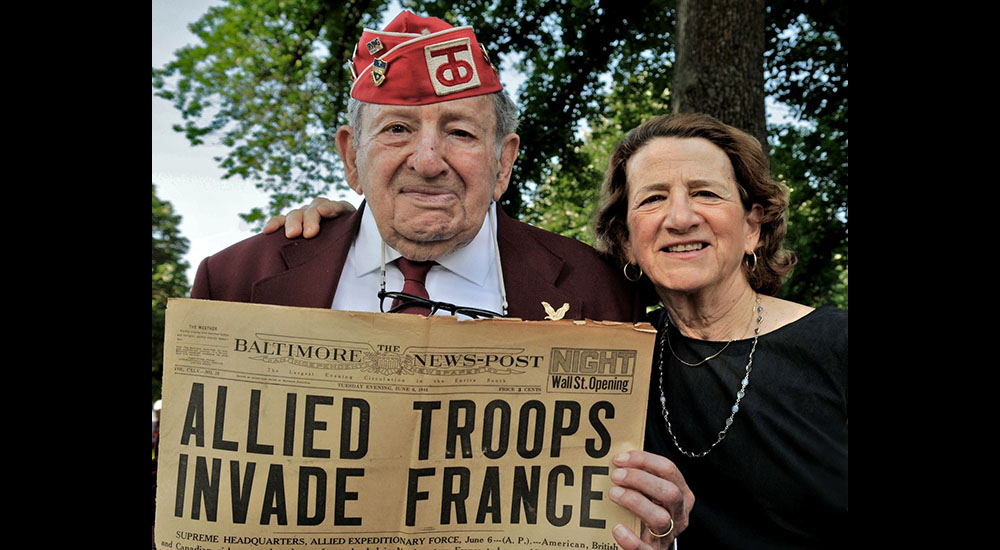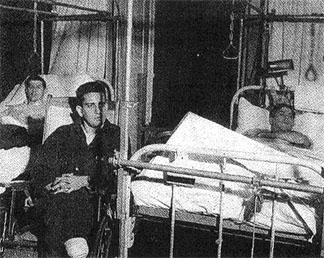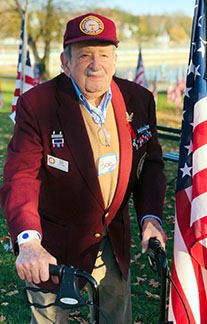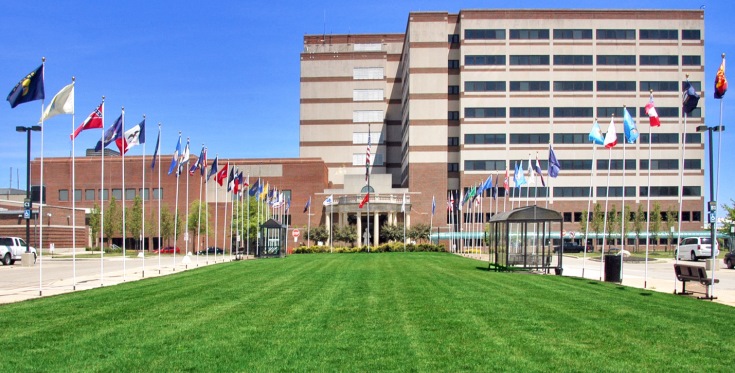When he was an Army private in WWII, Bob Levine didn’t want to tell his parents how badly he had been wounded, so he wrote a couple of deceptively calm letters.
“They took our blankets away so we don’t have much protection from the cold, just our raincoats and shelter-halves. The local Frenchmen gave us wine and cider, which is really good stuff.”
He hinted at it in his next letter.
“We are now in an evacuation hospital awaiting our return to England and for me, a trip to the States very shortly. This field hospital is like heaven after our little stay with the Jerries.”
A couple of weeks later, he figured the Army had probably sent one of those telegrams, so he decided to tell them the full story.
“The story in brief is that I was wounded and captured by the Jerries. I was recaptured by the Americans four weeks later. The sadder news of the story is that my right foot had to be amputated at the ankle.”
He closed with: “I just want you to remember that the good Lord has been a lot kinder to me than you could imagine and if I sound too nonchalant about the loss of my foot, it is only because I realize it and am grateful it was not worse.”
The origin of Levine’s stoic reserve is evident in the telegram his father sent back: “Dear Bob, Hope you feel okay. All’s well at home. Keep your chin up. Love, Dad.”
The mystery of the missing dog tags
There is a remarkable story surrounding Levine’s injury and recovery. German soldiers left him on a table in a French farmhouse believing he would not survive. Two German doctors moved him to a field hospital to operate on him.
One of the doctors looked at his dog tags and noticed the “H.” It stood for Hebrew. The doctors patched him up and moved him to another hospital.
When Levine awoke, his foot was gone… and so were his dog tags.
The episode is dramatically told in a book by Henri Levaufre, a Frenchman who befriended Levine and found the German doctors who operated on him. Amazingly, thanks to a routine doctor’s diagnosis on a small piece of paper tucked in Levine’s pocket, they were able to find the doctors, one of whom had passed away.
Levine and his wife were later reunited with the surviving doctor and his family. No one was sure if the deceased doctor had taken the dog tags to save his life.
Follows Veteran’s car to tell him about VA
Levine is 95. He receives regular treatment from VA, and enjoys being one of VA’s biggest promoters. A couple of examples:
“On the Fourth of July, we were in a boat as fireworks were going off. Each time there was an explosion, one of the men would react. He told me he had been in Korea. I told him to go visit VA. He did and he got good results.
“Once I saw someone’s car license plate was DAV (Disabled American Veterans). So, I followed him until I got to talk to him. He then joined VA and got his benefits. I find it very rewarding to do this, to reach out and help others, connect them to VA.”
Levine’s health care is managed by the Syracuse VA amputee clinic team after moving to Ithaca, NY, from New Jersey.
Lost his wife to COVID
Prior to his move to Central NY, Levine received care at the East Orange VA. After recovering from COVID and losing his wife to the disease, his daughter moved him to Ithaca to be closer to her.
Karen Hughes, Amputation Rehabilitation Coordinator for the Syracuse VA, describes his current care.
“We prescribed his most recent prosthesis. He initially selected us, the Syracuse VA, to fabricate his prosthesis, but due to travel distance and our fast approaching winter weather, they transferred vendor care to Ithaca after he received his new prosthesis.
“We will continue to follow him at Syracuse for his amputee related care needs. As you know, his story is amazing and it is an honor to assist him with any care needs he may have.”
“We are proud to be the team that helps them”
Patty Young explains further. “The Amputation System of Care (ASoC) is a national program of 25 VA sites with focused Amputation Care Teams. We provide comprehensive, holistic and patient-centered care for the entirety of the Veteran’s life.
“It is the connections through the ASoC that helped Mr. Levine transfer his care seamlessly from New Jersey to Syracuse, and that is what ASoC is all about – continuum of care that never falters.
“We have so many amazing Veterans who have overcome so many challenges in their lives and we are proud to be the team that helps them excel in life to achieve their goals. TeleAmputation Care happens all over the country and has been happening since 2008.
“When COVID hit, we just changed each appointment to Telehealth and didn’t skip a beat since all of our sites had been integrating telehealth as a means of treating Veterans all along.”
Young is the Amputation System of Care National Program Manager, Rehabilitation and Prosthetic Services and National Telerehabilitation lead.
His advice on how to get to 95?
“Stay well. Marry well. Have a positive attitude,” Levine said. “When you don’t think you are going to live to your 20th birthday and then you wake up, everything after that is a gift.
“Living is something I appreciate every day of my life. I have appreciated surviving. And having a beautiful family, finding a perfect life partner, having children, grandchildren and great children makes it all worthwhile.”
Special thanks to Bob’s daughter Jane Powers (in the top photo with her dad) for assisting with this story. She is the Project Director of ACT for Youth Center for Community Action at Cornell University, Bronfenbrenner Center for Translational Research, in Ithaca, New York.
Top photo by Daniel Arant, a volunteer with the U.S. National Park Service.
Topics in this story
More Stories
Larry Trujillo lost 44 pounds and improved his relationship with food during the 90-day TeleMOVE! telehealth program.
The Dayton VA Medical Center released its March 2025 Good News Report, spotlighting compassionate care, special recognitions, and life moments shared by Veterans and staff.
Each year, I return to honor my old corpsman's memory and reflect on serving together.








I admire Bob Levine for his positive attitude and his appreciation for the VA Medical Service that we Veterans enjoy every day. I am 93 now, a veteran of the Army Air Corps, and in excellent health these days. I was just beginning my pilot training at Keesler Field in Mississippi when the war ended. So I stayed in the service for six years but fortunately my buddies and I did not have to experience the combat that we were training for; the invasion of Japan. That would have been brutal.
God Bless our great country and thanks to the VA Medical Service. Jim Hearn, Spicewood, Texas
Mr. Levine’s story is typical of all the members of his generation. A positive attitute and appreciation for what you have.He is an inspiration to us all.God Bless him. Thank You, Shawn McAvey USN .
And Thank You Shawn for recognizing the Great Generation, and for your service too.